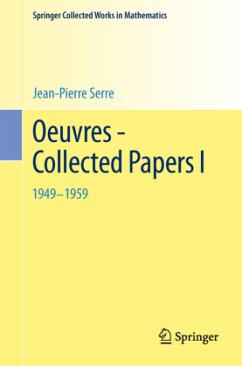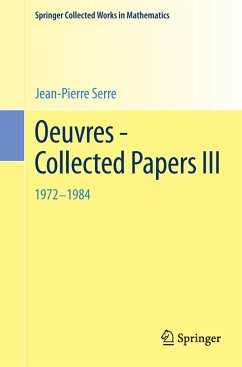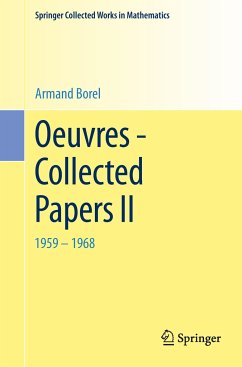
Selected Papers - Oeuvres Scientifiques I
Topology and Fixed Point Theorems Topologie et Théorème du Point Fixe Topologie et Théorème du Point Fixe
Herausgegeben: Malliavin, Paul;Mitarbeit: Borel, A.
Versandkostenfrei!
Versandfertig in 6-10 Tagen
48,99 €
inkl. MwSt.

PAYBACK Punkte
24 °P sammeln!
Jean Leray (1906-1998) was one of the great French mathematicians of his century. His life's work can be divided into 3 major areas, reflected in these 3 volumes. Volume I, to which an Introduction has been contributed by A. Borel, covers Leray's seminal work in algebraic topology, where he created sheaf theory and discovered the spectral sequences. Volume II, with an introduction by P. Lax, covers fluid mechanics and partial differential equations. Leray demonstrated the existence of the infinite-time extension of weak solutions of the Navier-Stokes equations; 60 years later this profound wor...
Jean Leray (1906-1998) was one of the great French mathematicians of his century. His life's work can be divided into 3 major areas, reflected in these 3 volumes. Volume I, to which an Introduction has been contributed by A. Borel, covers Leray's seminal work in algebraic topology, where he created sheaf theory and discovered the spectral sequences. Volume II, with an introduction by P. Lax, covers fluid mechanics and partial differential equations. Leray demonstrated the existence of the infinite-time extension of weak solutions of the Navier-Stokes equations; 60 years later this profound work has retained all its impact. Volume III, on the theory of several complex variables, has a long introduction by G. Henkin. Leray's work on the ramified Cauchy problem will stand for centuries alongside the Cauchy-Kovalevska theorem for the unramified case.
He was awarded the Malaxa Prize (1938), the Grand Prix in Mathematical Sciences (1940), the Feltrinelli Prize (1971), the Wolf Prize in Mathematics (1979) and the Lomonosov Gold Medal (1988).
He was awarded the Malaxa Prize (1938), the Grand Prix in Mathematical Sciences (1940), the Feltrinelli Prize (1971), the Wolf Prize in Mathematics (1979) and the Lomonosov Gold Medal (1988).












